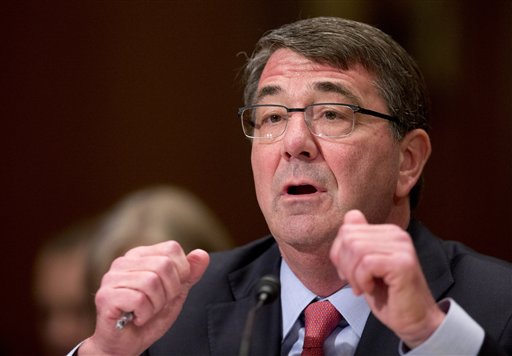US affirms ‘ironclad’ support for Philippines
US Defense Secretary Ashton Carter told Philippine Defense Secretary Voltaire Gazmin that Washington’s pledge to defend the Pacific nation remained “ironclad,” and called for an end to land reclamation in the South China Sea.
Carter met with Gazmin in Honolulu during the change-of-command ceremonies at the US Pacific Command (Pacom) and the retirement of the Pacom commander, Adm. Samuel Locklear III.
In talks with Gazmin, the Pentagon chief “reaffirmed” the strong ties between the two countries and discussed territorial disputes in the South China Sea, where Beijing has been at loggerheads with the Philippines and other claimant states.
Citing Washington’s mutual defense treaty with Manila, Carter “stressed that the US commitment to defend the Philippines is ironclad,” the Pentagon said in a statement.
For Malacañang, there is no reason to doubt the US “ironclad commitment” to help defend the Philippines in the face of China’s land reclamation.
“There is an adage that goes, ‘Actions have more weight than words,’” said Communications Secretary Herminio Coloma Jr.
Coloma was responding to a question on how the administration would assuage doubts about whether the United States could be relied upon when push comes to shove.
“It would be better if we look at the concrete actions that both parties have done and how these have responded to the different challenges that we’ve seen through the years,” he said.
The meeting with Gazmin came as Carter embarked on a tour of Asia and amid rising tensions over Beijing’s massive effort to build artificial islands in the South China Sea.
Carter and Gazmin “agreed that all parties involved in the South China Sea should seek a peaceful resolution of disputes, immediately halt land reclamation, and stop further militarization of disputed features,” the statement said.
Reclamation expanded
Manila has said it will keep flying over disputed areas in the South China Sea despite Beijing’s warnings. And this month, the Philippines took part in a groundbreaking naval exercise with Japan, in a move aimed at countering a rising China.
Beijing has expanded its land reclamation work in the South China Sea at a dramatic pace, constructing man-made islands on top of reefs across a wide area to back up its territorial claims.
China insists it has a right to control nearly all of the South China Sea, including waters near the coasts of the Philippines, Vietnam and other Asian neighbors.
The Chinese military last week ordered a US Navy P-8 Poseidon surveillance plane to leave an area above the disputed Spratly islands. The American aircraft ignored the demand and said it was flying in what US officials consider international airspace.
A Pentagon statement issued in Washington said Carter welcomed the opportunity to discuss security issues with the Philippines, which he considered one of America’s strongest allies in the Asia-Pacific.
Carter said the US-Philippine defense pact had bound the two countries for more than 60 years and reiterated US President Barack Obama’s statement the two nations’ “common determination to defend themselves against external armed attacks, so that no potential aggressor could be under the illusion that either of them stands alone.”
Gazmin, in a text message about the meeting, said the United States expressed concern about unilateral activities inconsistent with international law.
“Unilateral actions escalate tensions which may lead to actual conflict,” Gazmin said. “Actions that could lead to accidents and untoward incidents due to miscalculations should be avoided.”
Rule of law
Gazmin said Carter believed the rule of law should prevail on the issue.
Carter and Gazmin agreed that all parties should seek a peaceful resolution of disputes, immediately halt land reclamation and stop further militarization of disputed areas.
They also vowed to explore opportunities for developing each other’s defense posture.
At the Pacom ceremonies, Carter declared that the United States would continue to remain the principal security power in the Pacific for decades to come.
“First, we want a peaceful resolution of all disputes and an immediate and lasting halt to land reclamation by any claimant. We also oppose any further militarization of disputed features,” Carter said.
“Second, and there should be no mistake: The United States will fly, sail and operate wherever international law allows, as we do all around the world,” he added.
Carter said China’s actions in the South China Sea were “out of step with both international norms that underscore the Asia-Pacific’s security architecture, and the regional consensus in favor of non-coercive approaches to this and other long-standing disputes.”
Demand for US action
He also said China’s actions were bringing countries in the region together in new ways. “They’re increasing demand for American engagement in the Asia-Pacific. We’re going to meet it,” he stressed.
Washington has deployed more ships and aircraft to the Asia-Pacific in the past two years and tried to strengthen its ties to partners in the area as part of its “rebalance” to Asia, which comes as a response to China’s growing military might.
Carter is due to visit Singapore, Vietnam and India in his second tour of the region since taking over at the Pentagon in February.
Illusion of US support
Coloma said there had been “several developments in RP-US bilateral relations,” including the signing of the Visiting Forces Agreement (VFA) and the Enhanced Defense Cooperation Agreement (Edca).
“We can see that through the passage of time, our relationship has been consistent and strong,” he said.
As expected, militant groups blasted the Carter-Gazmin meeting.
Bagong Alyansang Makabayan (Bayan) said Carter’s “ironclad commitment” was “recycled from last year’s visit” of President Obama to Manila.
“The Carter statement is carefully crafted to justify the US military pivot to Asia, in particular, the return of US bases in the Philippines. It gives the illusion of US support,” Bayan secretary general Renato Reyes said.–With a report from AFP
Originally posted as of 1:25 PM | May 28, 2015
RELATED STORIES
PH, US defense chiefs to meet in Hawaii on sea dispute















